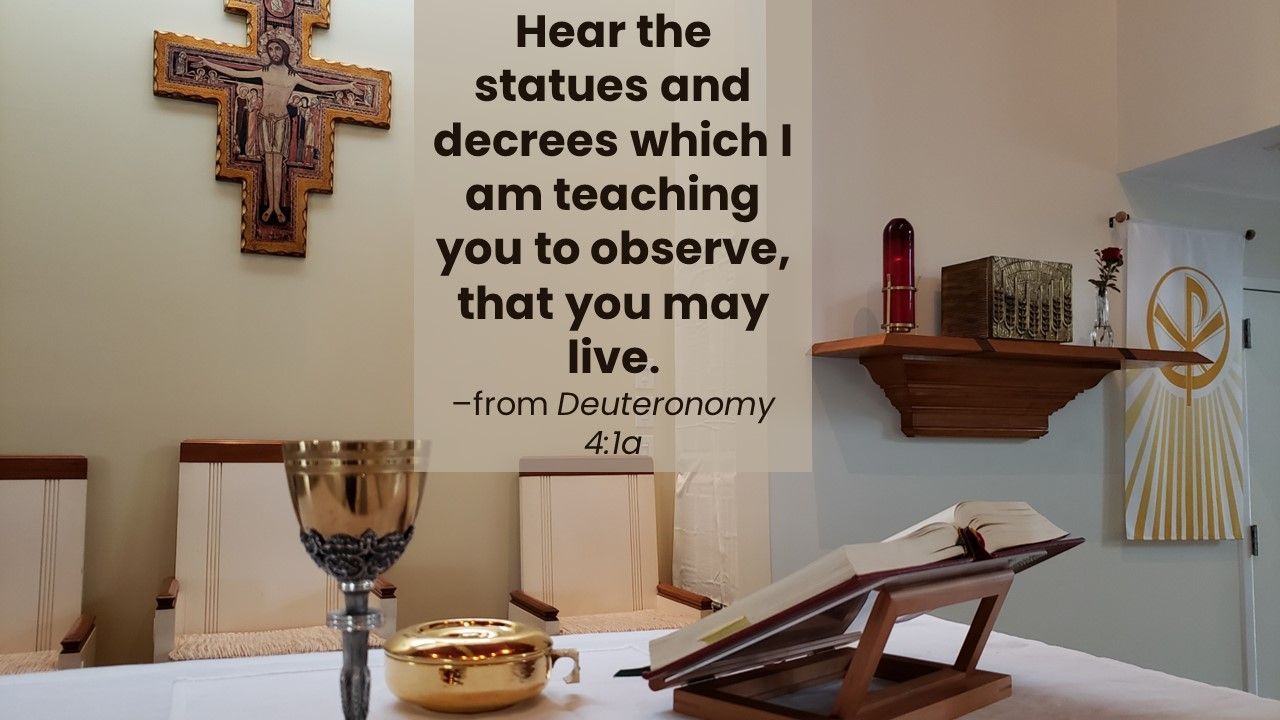Homily - 22nd Sunday in Ordinary Time
Homily - 22nd Sunday in Ordinary Time - September 1, 2024

Deuteronomy 4:1-2,6-8; James 1:17-18,21-22,27; Mark 7:1-8,14-15,21-23
Life, wherever and however lived, is governed and conditioned by laws and traditions that people have created. These laws and traditions can be beneficial to maintaining a sense of order in society. Our introduction to rules comes early on in life. It is hard to imagine a family that didn’t have “household rules” about bedtimes, curfews, meals and snacks, and television. More recently, family rules have also come to include social networking and gaming.
As we grow older, we encounter rules in school and in the workplace. The policies and procedures that guide much of our academic and professional lives are in fact “rules”. This same reality holds true for the Church. Canon law and diocesan or parish policies set the course for the prayer and ministry of parishes and religious communities all over the world.
In this weekend’s Gospel, we are presented with a tense scene in which Jesus and his followers are being publicly criticized by certain religious leaders for disregarding rules of ritual washing. These ritual acts of washing hands and feet go back to the Book of Exodus (cf. 30:19, 40:12) and were originally only intended for priests who were entering the Tent of Meeting. Centuries later, in the time of Jesus, some Jews who were not priests had begun to ritually wash before prayer and meals, and even extended the ritual to their cooking utensils and food. They believed that these customs should be universal and be strictly followed.
In response to the criticisms hurled at him, Jesus reminded his critics of what is truly important by challenging them to change their focus: it is not external realities that make us “unclean” or the observance of specific rules that ensures that we are in a right relationship with God. Instead, it is our intentions and the purity of our hearts that matter most to God: “Nothing that enters one from outside can defile that person; but the things that come out from within are what defile…” (Mark 7/15)
Without any doubt, rules and traditions are incredibly important and they help us solidify our identity as Catholic-Christians. At the same time, we have to be sure that we do not become so fixated on the details of certain traditions or teachings that we risk losing sight of what is most important: The Gospel of Jesus Christ. What Jesus criticizes is traditions that are cut off from the faith that gives them life. Careful observance of regulations does not replace the religion of the heart.
Holiness and sin are on the inside---the heart and soul of the person. So, all our traditions should express, renew, and deepen our faith. They express, but they do not replace faith. They remind us of who we are and what we are called to be. And we have many of them--wearing a religious medal, hanging a crucifix at home, days and acts of penance, times of prayer, signs of respect for religious things and places are all ways that we let our faith grow and express itself concretely and visibly in our life.
However, they should never become automatic, almost unthinking reflexes.
· How many of us remember that blessing ourselves with holy water is a reminder and recommitment to our baptismal promises?
· How many of us remember that making the sign of the cross is a way of placing ourselves under the might power of the Holy Trinity?
· How often do we find ourselves reciting prayers rather than praying them?
· And do we use the sacrament of reconciliation to replace reconciliations we have to initiate outside the confessional?
· Or do we receive Holy Communion as a replacement for the communion with others we need to foster outside of Mass?
Jesus did not come to abolish the law but to fulfill it. He gave a new tradition that begins and ends with love. Jesus asks us to let love transform our hearts and souls so that we transform the world. In his first Apostolic exhortation Evangelii Gaudium- The Joy of the Gospel, Pope Francis shared this reflection: “Christian morality is not a form of stoicism, or self-denial, or merely a practical philosophy or a catalogue of sins and faults. Before all else, the Gospel invites us to respond to the God of love who saves us, to see God in others and to go forth from ourselves to seek the good of others. Under no circumstances can this invitation be obscured! All of the virtues are at the service of this response to love.” #39.
May our external actions always be a true reflection of something interior.
Let me end with a little joke: A priest was going through the mail one day after his powerful sermon about Pharisaic life on the previous Sunday. Drawing a single sheet of paper from one envelope, he found written on it just one word: "FOOL." The next Sunday at Mass, he announced, "I have known many people who have written letters and forgot to sign their names. But this week I received a letter from someone who signed his name and forgot to write a letter." Happy Labor Day weekend.
Homilies











